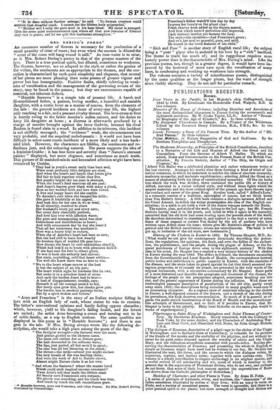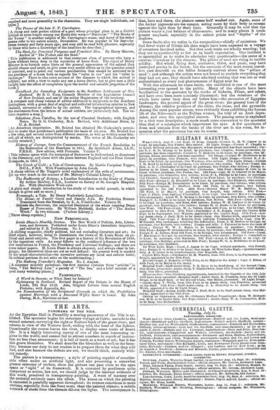PUBLICATIONS RECEIVED.
Boors.
Four Years in the Pacific, in her Majesty's ship Coltingweod, front 1844 to 184& By Lieutenant the Honourable Fred. Walpole, E.N. In two volumes.
Memoirs of the House of Orleans; including Sketches and Anecdotes of the most distinguished characters in France daring the seventeenth and eighteenth centuries. By W. Cooke Taylor, LL.D., Author of "Roman- tic Biography of the Age of Elizabeth,' &c. In three volumes. The Emigrant Churchman in Canada. By a Pioneer of the Wilderness. Edited by the Reverend Henry Christmas, MA., F.R.S., &c. In two volumes.
Edonie Vermont; a Story of the Present Time. By the Author of "Mil- dred Vernon." In three volumes.
Pietas Afeerica; or Nature Suggestive of God and Godliness. By the Brothers Theophilus and TheophylacS The Moderate Monarchy; or Principles of the British Constitution, described in a Narrative of the Life and Maxims of Alfred the Great and his Counsellors. From the German of Albert V. Haller. To which are added, Notes and Commentaries on the Present State of the British Con- stitution. By Francis Steinitz, Author of " The Ship, its Origin and Progress," &c. [Albert Von Haller was a celebrated physician and rather voluminous writer of the last century. Amongst his works were three forming a kind of triad of his- torical romances, in which he undertook to exhibit his ideas of absolute monarchy, moderate monarchy, and moderate republicanism ; selecting Alfred the Great as a means of shadowing forth his ideas of constitutional monarchy. Of the six books into which the work was divided, three contained the public life or history of Alfred, narrated in a rather inflated style, and without those lights which the ampler materials and the more critical spirit of the present age have thrown upon the conduct and career of the great King. Another book, called " Alfred's Love," is a romantic version of a tradition, apocryphal of course, but we think better than Von Haller's history. A fifth book contains a dialogue between Alfred and his friend Amund, itnwhich the writer promuigateashis idea of the English con- stitution; in a sixth is set forth a view of the Saxon-voyages towards the North.
The matter, plan, and style of the work, belong to the last age; -hut Mr. Francis Steinitz having read it in his youth, and fallen in with it again in his maturity, conceived that the old book had some bearing upon the preysent state of the world. He therefore determined to translate it, and append to the text a variety of notes. Some of these expand or correct Von Haller by the aid of authors who have written upon Alfred since his time; others give Mr. Steinits's ideas of politics in general and the British constitution; others are miscellaneous. The book is well got up, in imitation of the old style, now fashionable.]
History of the Cholera in Exeter in 1832. By Thomas Shapter, M.D., &c. [What would we not give for contemporary documents describing the precau- tions, the regulations, the opinions, the fears, and even the follies of the authori- ties, the practitioners, and the people, during the plague of Athens, or the fre- quent pestilences of Europe down even to the eighteenth century? With this idea in his mind, Dr. Shapter has cimpiled a very minute history of the cholera in Exeter during the year 1832. The orders in Council, the documents emanating from the Governmental and Local Boards of Health, the correspondence between public bodies and individuals in public capacity in Exeter, with the statistics of the disease, and the steps taken to guard against its (at that time) assumed con- tagious properties. or to remedy its attack, are presented in the very words of the original documents, with a connective commentary by Dr. Shapter. Some parts of a more historical cast describe the symptoms and treatment of the disease, the feelings of the people on the precautions adopted, sometimes breaking out into riot, and the general appearance of Exeter daring the infliction. With these are intermingled passages descriptive of peculiarities of the old city, partly swept away since 1832 ; the descriptions being embodied in many graphic wood-cuts of an interesting character. As a copious store of materials relating to the cholera in Exeter, a well-digested account of the disease, and a sketch of the city during itsrevalence, the book deserves commendation. So much of it is general as re- gards the panic-struck lucubrations of the Board of Health and the unworkman- like attempts of Government, and so little of it .peculiar to Exeter, that Dr. Shapter is lucky in his priority. Many local histories on the same plan would be works of supererogation.]
Pilgrimages to Saint Mary of Walsingham and Saint Thomas of Canter- bury. By Desiderius Erasmus. Newly translated, with the Colloquy on Rash Vows, by the same Author, and his Characters of Archbishop War- ham and Dean Colet, and illustrated with Notes, by John Gough Nichols, F.S.A.
[The dialogue of Erasmus, descriptive of a pilgrimage to the shrine of the Virgin at Walsingham and to Becket's tomb at Canterbury, is valuable for its pictures of the frauds of the monks and the credulity of the pilgrims, and not without in- terest for its quiet satire directed against the worship of saints and the Virgin Mary, and the ridiculous absurdities connected with pseudo-relics. Besides pre- serving the characteristics of Erasmus, and presenting the whole in English as simple as Erasmus might have used had he written in our day, Mr. Nichols has illustrated the text, the times, and the scenes to which the dialogue refers, by numerous, copious, and learned notes; together with some curious cuts. The volume is a timely contribution to elegant archaeology in its original matter, and a useful revival of old scholarship and wit, much of which is familiar to the present day in the arguments of Protestant divines, who do not own, and perhaps do not know, that some of their best reasons against the superstitions of Rome are drawn from the Catholic philaeopher of Rotterdam.]
Sketches of Character, and other Pieces in Verse. By Aims H. Potts.
[A series of portraits of husbands, wives, and maidens, the "characters " of the ladies sometimes illustrated by stories their lives; with an essay in verse on Pride, and &variety of occasional poems. The verse is agreeable, and there is a quiet poetical spirit in the pieces; but more strength of thought and diction art
required and more generality in the characters. They are single individuals, not The Poems of the late N. T. Carrington.
LA cheap and neat pocket edition of a poet whose principal piece is on a district noticed at some length among our Books this week—"Dartmoor." "The Banks of the Tamar" is another subject of Mr. Carrington's muse; and many of his minor poems refer to his native county, Devonshire. He was popular in his day—be- tween twenty and forty years ago; and may still be read with pleasure, especially by those who have a knowledge of the localities he describes.]
The Stud, for Practical Purposes and Practical Men. By Harry Hieover, Author of " The Pccliet and the Stud."
[This publication is addressed to that numerous class of persons who keep a
horse without being deep in the mysteries of horse-flesh. be object of Harry ifieover is to furnish some hints on the general appearance of the animal they should choose and avoid, to give some very useful advice as to the question sound or unsound, and to point out various peculiarities that should be attended to in the purchase of a horse both as regards his "value in use" and his "value in exchange." There is also some account of the diseases to which the animal is subject; not with a view to make any one a horse-doctor' but to give men a little insight into the effect of complaints upon the useful and saleable properties of the horse.]
Handbook for Intending Emigrants to the Southern Settlements of New Zealand. By B. G. lsarp, formerly Member of the Legislative Council of New Zealand, and one of the senior Magistrates of the territory. [A compact and cheap volume of advice addressed to emigrants to the Southern hemisphere, with a great deal of original and collected information relative to New Zealand, corrected or added to by the author. The topographical surveys, and the statements from the letters of, actual settlers, are particularly full. The vo- lume requires a map.] Selections from Catullus, for the use of Classical Students; with English Notes. By G. G. Cookesley, M.A. Revised, with Additional Notes, by C. A. Bristed.
[An American importation. Mr. Bristed has obtained Mr. Cookesley's permis- sion to make that gentleman's publication the basis of his own. Mr. Bristed has a few odes, and several notes from different sources, as well as written some him- self, all of which are distinguished by marks. The notes of Mr. Cookesley are mostly retained.]
History of Europe, from the Commencement of the French Revolution to the Restoration of the Bourbons in 1815. By Archibald Alison, LL.D., F.R.S.E. New edition, with Portraits. Volume V.
[This volume opens with the campaign of Suwarrow in Switzerland, so disastrous to the Directory, and closes with the peace between England and the First Consul Bonaparte, in 1801.]
The Crock of Gold ; a Tale of Covetousness. By Martin Farquhar Tapper, F.R.&- With Frontispiece by John Leech.
[A cheap edition of Mr. Topper's novel explanatory of the evils of covetousness; got up very much in the manner of Mr. Murray's Colonial Library.]
The Rudiments of Botany; a Familiar Introduction to the Study of Plants. By Arthur Henfrey, F.L.S, Lecturer on Botany at St. Georges Hospital, &c. With illustrative Wood-cuts.
[A plain and simple introduction to the study of this useful pursuit, in which enough is given sad no more.] Kavanagh; s Tale. By Henry Wadsvierth Longfellow. The Home; .or Family Cares and Family Joys. By Frederika Bremer. Translated from the Swedish, by E. A. Friedliender. Volume II. Sidonia the Sorceress, the supposedDestroyer of the whole reigning Ducal House of Pomerania. By William Meinhold, Author of " The Amber Witch." In two volumes. (Parlour Library.) [Three cheap reprints.] NEW PERIODICALS.
Louis Blanc's Monthly Review. The New World of Politics, Arts, Liters- tuna and Sciences. Published under Louis Blanc's immediate inspection, and edited by F. R. Trehonnaie. No. L
[A shilling magazine, chiefly political, but not excluding literature and art; its chief object, however, being to disseminate the views of M. Louis Blanc on po- litical and social subjects. The first paper is a history of the Revolution of 1848, by the ingenious exile. An essay follows on the combined influence of the two new institutions in France, the Presidency and Universal Suffrage; and there are some minor papers. M. Louis Blanc is always eloquent, and always clear in lan- guage; his theoretical ideas are not so well defined: the present work is marked by his usual characteristics—its narrative portions are lucid and enforce belief; its critical portions do not seize on the understanding.]
The Railway Traveller's Magazine. No. I. August. [A sixpenny monthly periodical: the first number contains three "articles " in verse, "The Railway Line" a parody of "The Sea," and a brief account of a good many watering-places.] PAMPHLETS.
A Word in Season; or What Next for Ireland?
Episcopacy in Scotland. Revised Report of the Debate in the House of Lords, 22d May 1849. Also, Original Letters from several English Prelates; with Appendix, &c. An Examination of the Scriptural Grounds on which the Prohibition against Marriage with a Deceased Wife's Sister is based. By John Daring, M.A., Barrister-at-law.



























 Previous page
Previous page